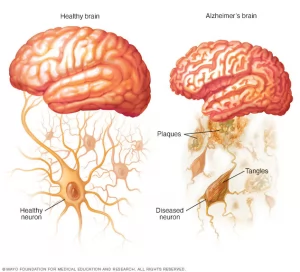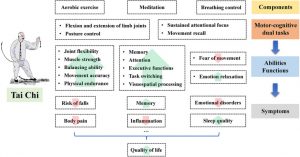By John M. de Castro, Ph.D.
“People do not realize that Alzheimer’s is not old age. It is a progressive and fatal disease and staggering amounts of people develop Alzheimer’s every day.” – Melina Kanakaredes
The normal aging process involves a systematic progressive decline in every system in the body, the brain included. The elderly often have problems with attention, thinking, and memory, known as mild cognitive impairment. But sometimes the decline is rapid and results in dementia; a progressive loss of mental function produced by degenerative diseases of the brain. It is quite common with about 3% of adults ages 70 to 74, 22% of adults ages 85 to 89 and 33% of adults ages 90 and older. Between 60% to 80% of dementia cases are classified as Alzheimer’s Disease.
An encouraging new development is that mindfulness practices such as meditation training and mindful movement practices can significantly reduce these declines in cognitive ability and dementia. In addition, it has been found that mindfulness practices reduce the deterioration of the brain that occurs with aging restraining the loss of neural tissue. This suggests that mindfulness may help to relieve some of the symptoms and/or slow the progression of mild Alzheimer’s Disease.
In today’s Research News article “Mindfulness Prevents Depression and Psychopathology in Elderly People with Mild to Moderate Alzheimer’s Disease: A Randomized Clinical Trial.” (See summary below or view the full text of the study at: https://www.ncbi.nlm.nih.gov/pmc/articles/PMC9881020/) Quintana-Hernández and colleagues recruited elderly patients with mild to moderate Alzheimer’s Disease and randomly assigned them to one of four conditions; Mindfulness-based Alzheimer’s Stimulation; CS, Cognitive Stimulation; PMR, Progressive Muscle Relaxation; or no treatment. All participants received 3 weekly sessions for 2 years combined with daily 10 mg Donepezil. They were measured for depression, geriatric depression, and neuropsychological symptoms at baseline or 6, 12, 18, and 24 months later.
They found that the groups did not differ at baseline but that the Mindfulness-based Alzheimer’s Stimulation group had significantly lower scores than the other 3 groups at the 6-, 12-, 18-, and 24-months for depression, insomnia, agitation, anxiety, somatic symptoms, weight loss, delusions, apathy, irritability, and night time behaviors and higher levels of appetite and insight. These measures for the mindfulness group did not differ from baseline at any follow up while the other 3 groups significantly deteriorated over time relative to baseline.
These findings suggest that mindfulness training prevents deterioration in depression and psychopathology while other treatments or no treatment continue to deteriorate. Hence mindfulness training would appear be beneficial in the treatment of patients with mild to moderate Alzheimer’s Disease.
“You only know yourself because of your memories.” – Andrea Gillies
CMCS – Center for Mindfulness and Contemplative Studies
This and other Contemplative Studies posts are also available on the Contemplative Studies Blog http://contemplative-studies.org
Study Summary
Quintana-Hernández DJ, Rojas-Hernández J, Santana-Del Pino A, Céspedes Suárez C, Pellejero Silva M, Miró-Barrachina MT, Ibáñez Fernández I, Estupiñán López JA, Borkel LF. Mindfulness Prevents Depression and Psychopathology in Elderly People with Mild to Moderate Alzheimer’s Disease: A Randomized Clinical Trial. J Alzheimers Dis. 2023;91(1):471-481. doi: 10.3233/JAD-220889. PMID: 36442199; PMCID: PMC9881020.
Abstract
Background:
This longitudinal study addressed whether mindfulness practice prevents psychological and behavioral symptoms, especially mood disorders, in Alzheimer’s disease (AD).
Objective:
To assess the incidence of depression in the course of AD and to determine which non-pharmacological treatment (NPT) is most effective in preventing psychopathological symptoms.
Methods:
We conducted a longitudinal, non-inferiority and equivalence randomized clinical trial, repeated-measures design, with a control group and three experimental treatments: mindfulness, cognitive stimulation, and relaxation. Each experimental group performed three weekly sessions for two years. The pharmacological treatment of all participants was donepezil (10 mg). Participants were patients with probable AD without diagnosed depression from the public neurology services of the Canary Health Service, Spain. Psychological evaluation was performed using the Geriatric Depression Scale (GDS), Hamilton Depression Rating Scale (HDRS), and Neuropsychiatric Inventory (NPI-Q). The statistical analysis included only patients who attended at least 75% of the sessions. A nonparametric, repeated-measures analysis was performed with Kruskal-Wallis H test and between-group differences with Mann-Whitney U test with Bonferroni correction (p < 0.008). Effect size was calculated with partial eta-squared.
Results:
The results showed significant differences with large effect sizes (η2p>0.14) between mindfulness and the rest of the experimental groups as well as the control in the GDS, HDRS, and NPI-Q scales.
Conclusion:
Compared to the other experimental groups, only mindfulness prevented the onset of depression and other psychopathologies in early-stage AD. Based on its effectiveness in maintaining cognitive functions and preventing psychopathology, we recommend mindfulness as the first-choice NPT for mild to moderate AD.

